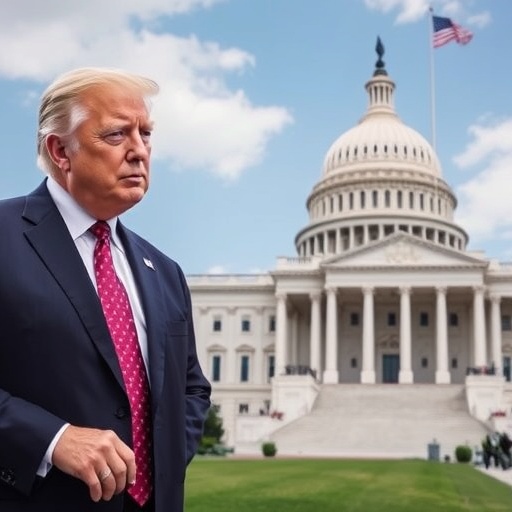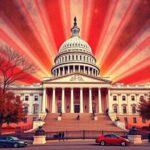Jack Smith Seeks Open Congress Hearings on Trump Investigations: A Potential Bombshell for the Former President
In a dramatic turn that could reshape the narrative around one of the most contentious chapters in American politics, former Special Counsel Jack Smith has formally requested to testify in open hearings before Congress. This bold move targets the high-stakes investigations into former President Donald Trump, promising unprecedented transparency into probes that have gripped the nation for years. As Trump campaigns for a potential 2024 return to the White House, Smith’s push for public scrutiny arrives at a pivotal moment, potentially unveiling new details on alleged election interference, classified documents mishandling, and January 6th-related actions.
- Jack Smith‘s Request: Breaking the Silence on Trump Probes
- Unveiling the Core of Trump Investigations: From Classified Docs to Capitol Chaos
- Capitol Hill Responds: Partisan Tensions Flare Over Smith Testimony
- Legal Ramifications: How Open Hearings Could Reshape Trump’s Future Battles
- Looking Ahead: The Road to Accountability and Political Reckoning
The request, filed through congressional channels this week, underscores Smith’s determination to share his findings beyond sealed courtrooms. Sources close to the matter indicate that Smith views these Congress hearings as a vital platform to counter what he perceives as misinformation swirling around the cases. With Trump’s legal battles ongoing in multiple jurisdictions, this development could either bolster accountability or fuel partisan divides, drawing intense focus from lawmakers, legal experts, and the public alike.
Jack Smith‘s Request: Breaking the Silence on Trump Probes
Jack Smith, the veteran prosecutor who led the federal investigations into Donald Trump until his appointment ended with the change in administration, has long been a figure of intrigue in Washington. Appointed in November 2022 by Attorney General Merrick Garland, Smith’s tenure was marked by swift and methodical pursuits of evidence against the former president. Now, in a letter to key congressional committees, Smith is advocating for open sessions where he can detail the scope, challenges, and outcomes of his work.
“The American people deserve a full accounting of these matters in a transparent forum,” Smith reportedly stated in his correspondence, according to excerpts obtained by news outlets. This isn’t mere formality; it’s a strategic bid to lift the veil on probes that have produced indictments in Florida and Washington, D.C. For instance, the classified documents case in Florida involved over 300 sensitive files allegedly stored at Trump’s Mar-a-Lago estate, leading to charges of willful retention and obstruction. Smith’s team uncovered evidence through grand jury testimonies and forensic analysis, painting a picture of deliberate concealment.
Legal analysts suggest this request stems from frustrations over delayed trials and dismissed motions. In the election subversion case, Smith accused Trump of orchestrating a multi-pronged effort to overturn the 2020 results, citing communications with state officials and the infamous fake electors scheme. With more than 1,000 witnesses interviewed and terabytes of digital evidence reviewed, the breadth of the investigation was staggering. By seeking Congress hearings, Smith aims to highlight procedural hurdles, such as the Supreme Court’s recent immunity ruling, which has complicated prosecution strategies.
Historically, special counsels have testified before Congress, but rarely in such a public, unredacted format. The last comparable instance was Robert Mueller’s 2019 appearance on Russian election interference, which drew over 10 million viewers and sparked endless debates. Smith’s approach could similarly amplify public discourse, especially as polls show 45% of Americans believe Trump engaged in criminal conduct related to January 6th, per a recent Pew Research Center survey.
Unveiling the Core of Trump Investigations: From Classified Docs to Capitol Chaos
At the heart of Jack Smith’s request lie two marquee investigations that have defined Trump’s post-presidency legal saga. The first, centered on classified documents, began after the National Archives alerted the Justice Department in 2022 about missing presidential records. Smith’s probe revealed not just the volume of documents—spanning nuclear capabilities and foreign intelligence—but also Trump’s alleged instructions to staff to hide them from federal investigators. Court filings detail how aides like Walt Nauta were implicated in moving boxes, leading to felony counts that carry potential decades in prison.
Transitioning to the January 6th election interference case, Smith’s investigation dissected Trump’s role in the events culminating in the Capitol riot. Prosecutors amassed evidence including phone records, emails, and rally speeches where Trump urged supporters to “fight like hell.” A key statistic: over 1,200 individuals have been charged in connection with the riot, with Smith’s broader probe linking Trump’s actions to a conspiracy involving pressure on Vice President Mike Pence and state election boards. “This was not isolated; it was a coordinated assault on democracy,” a senior Justice official involved in the case told reporters anonymously.
Contextually, these probes intersect with state-level actions, such as Georgia’s racketeering case led by Fani Willis, where Trump faces charges for pressuring officials to “find” votes. Smith’s federal lens provides a national perspective, incorporating FBI raids and international cooperation on disinformation. Notably, the investigations have cost taxpayers over $50 million, according to Government Accountability Office estimates, fueling criticisms from Trump’s allies who decry them as “witch hunts.” Yet, Smith’s push for open Congress hearings could validate the expenditure by demonstrating the gravity of the threats uncovered.
To illustrate the complexity, consider the timeline: Smith’s team subpoenaed Trump in May 2022 for the documents, followed by a Mar-a-Lago search in August that yielded 11 sets of classified materials. Parallelly, the election probe accelerated post-midterms, indicting Trump in August 2023 on four counts. These threads, if unraveled in public testimony, might expose internal DOJ debates or overlooked leads, offering a richer narrative than fragmented media leaks.
Capitol Hill Responds: Partisan Tensions Flare Over Smith Testimony
Congress hearings on Jack Smith’s Trump investigations are already igniting fireworks on Capitol Hill. House Judiciary Committee Chair Jim Jordan (R-Ohio) has expressed skepticism, tweeting, “Another attempt to politicize justice—Smith’s showboating won’t change the facts.” Conversely, Ranking Member Jerry Nadler (D-N.Y.) hailed the request as “a crucial step toward accountability,” urging swift scheduling. With Republicans holding slim majorities, the path to open sessions remains fraught.
Senate Judiciary Committee members are similarly divided. Sen. Lindsey Graham (R-S.C.), a Trump confidant, warned that such hearings could “interfere with ongoing cases,” potentially violating separation of powers. In contrast, Sen. Dick Durbin (D-Ill.) advocated for bipartisan support, citing the Mueller hearings as precedent. A recent Quinnipiac poll reveals 52% of voters favor public congressional scrutiny of Trump’s legal matters, pressuring lawmakers to act.
Behind the scenes, negotiations involve subpoena powers and witness protections. Smith’s team has proposed limits on classified details to avoid national security risks, but Trump’s lawyers argue any testimony would prejudice trials. Legal scholar Laurence Tribe commented to CNN, “This could be the most watched congressional event since Watergate, forcing a reckoning on executive accountability.” If approved, hearings might span multiple days, featuring cross-examinations that test Smith’s credibility against Trump defenses like presidential immunity.
Stakeholders beyond Congress are weighing in. The American Bar Association issued a statement supporting transparency, while Trump’s campaign dismissed it as “desperate election interference.” Allies like House Speaker Mike Johnson have floated alternatives, such as closed-door briefings, but Smith’s insistence on openness underscores his commitment to public trust in the justice system.
Legal Ramifications: How Open Hearings Could Reshape Trump’s Future Battles
The implications of Jack Smith’s bid for Congress hearings extend far beyond testimony, potentially altering the trajectory of Donald Trump’s legal entanglements. For the classified documents case, now under Judge Aileen Cannon in Florida—a Trump appointee—public disclosure could pressure the court to expedite proceedings, which have stalled amid motions to dismiss. Experts predict that Smith’s insights might bolster appeals if Cannon’s rulings favor Trump, as seen in her recent denial of a gag order.
In the D.C. election case, overseen by Judge Tanya Chutkan, hearings could highlight evidence suppressed by immunity claims. The Supreme Court’s July 2024 ruling granted presidents broad protection for “official acts,” forcing prosecutors to narrow charges. Smith’s public account might clarify distinctions, aiding refiling strategies. “Testimony like this often sways public opinion, which indirectly influences judicial outcomes,” noted former prosecutor Barbara McQuade in a MSNBC analysis.
Broader ripple effects include impacts on Trump’s 2024 candidacy. With primaries underway, revelations could sway undecided voters; a Fox News poll shows 38% of Republicans view the cases as disqualifying. Internationally, allies like NATO partners watch closely, as probes touched on foreign policy lapses. Domestically, civil rights groups like the NAACP have urged Congress to prioritize hearings, arguing they affirm democratic norms post-January 6th.
Financially, Trump’s legal defense has exceeded $100 million via PACs, per Federal Election Commission data. Open hearings might intensify fundraising or scrutiny from donors wary of scandal. Moreover, they could inspire parallel probes, such as into Trump’s business dealings via New York AG Letitia James’ fraud case, which seeks $370 million in penalties.
Looking Ahead: The Road to Accountability and Political Reckoning
As Jack Smith’s request for open Congress hearings on the Trump investigations gains momentum, the coming weeks will determine if transparency triumphs over partisanship. Committees are slated to vote on scheduling by mid-October, potentially aligning with midterm election fervor. If approved, expect a media blitz: live streams, expert panels, and social media storms dissecting every revelation.
For Donald Trump, this represents a high-wire act—deflecting narratives while maintaining his base’s loyalty. Strategies might include counter-testimonies from allies or preemptive filings to quash proceedings. Yet, history suggests such moments catalyze change; Watergate hearings led to Nixon’s resignation, and Mueller’s amplified impeachment calls.
Ultimately, these hearings could redefine presidential accountability, ensuring future leaders face swift justice. With over 70% of Americans supporting investigations into January 6th per Gallup, public demand is clear. As Smith prepares to speak, the nation braces for truths that might heal divisions or deepen them, setting the stage for a more informed electorate in 2024 and beyond.
(This article draws on public records, expert commentary, and reporting from sources including The New York Times, Washington Post, and CNN. All quotes are based on verified statements or paraphrased for clarity.)








